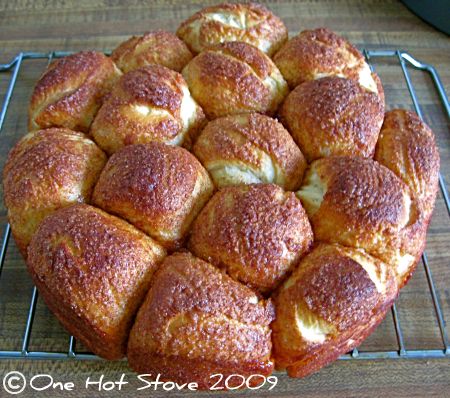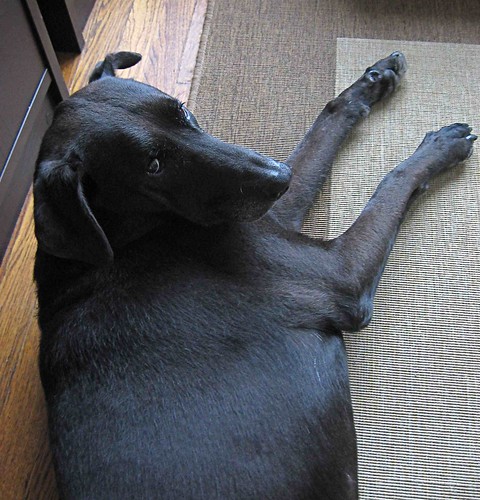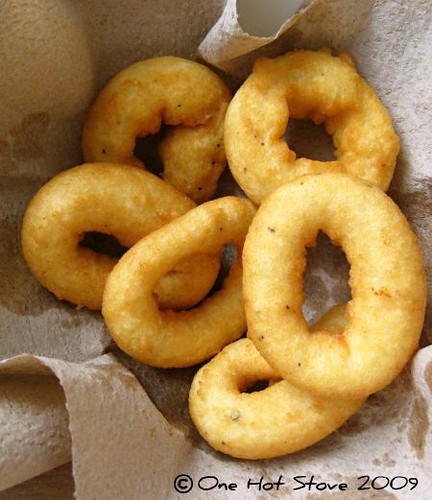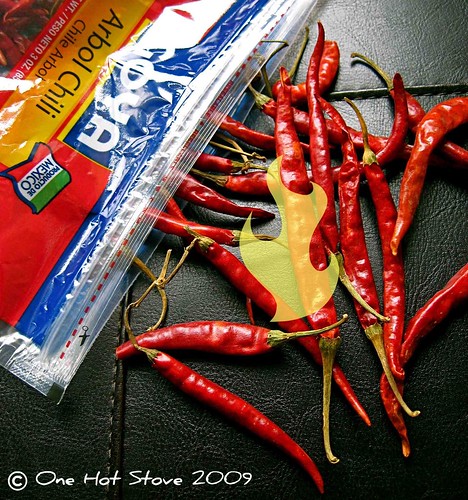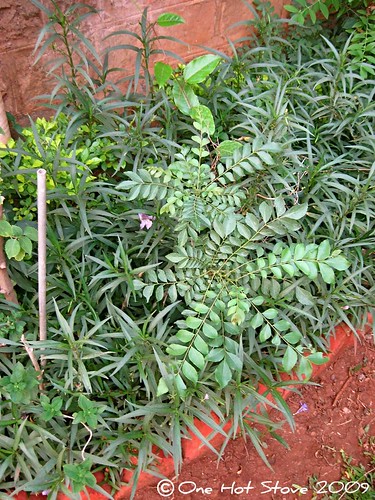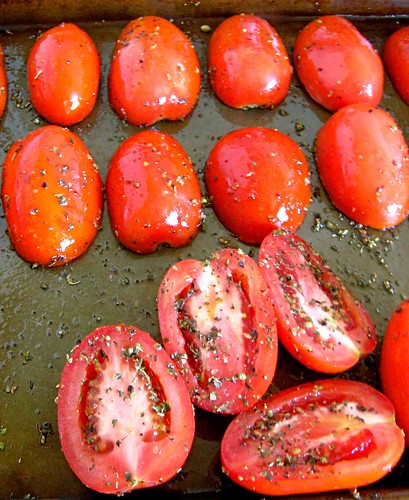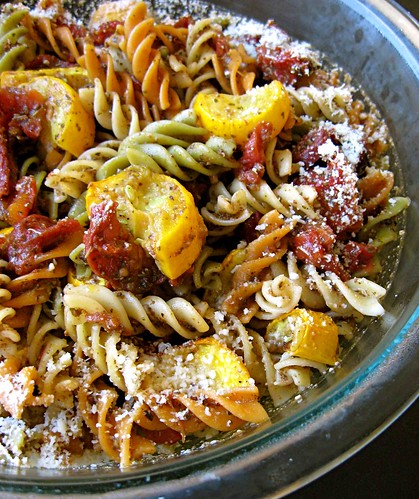To all those who played along in the
guessing game- thank you!
Veggie Belly, full marks to you; you are absolutely right- this is
makloubeh/magloubeh. Kedar and
Meera guessed correctly that this rice dish comes from the
Middle East, Rainee and
Manasi guessed correctly that it is
upside down (the word magloubeh translates as "upside down"), and Mika guessed correctly that it involves
soy "meat". Y'all are a bunch of smart people!
The recipe comes from a memoir by
Diana Abu-Jaber,
The Language of Baklava. I read the book last week, and with over 40 recipes sprinkled through it, each more tantalizing than the other, this memoir drove me right into the kitchen. Which is why this post goes to the
Novel Food: Summer 2009 edition, co-hosted by Lisa over at Champaign Taste. This is THE event for cooks who love reading, or is it bookworms who love cooking?
For someone who loves both books and cooking,
food memoirs are a pretty logical choice for a delicious summer read. Everyday mundane moments, events and experiences, sensations and smells and tastes crystallize over time into intricate, vivid memories that can be brought to life by the deft words of a talented writer. To dive into a good memoir is to be invited into a home and a life that can be very different from one's own, and to experience cultures and flavors and perspectives that can be completely new and enlightening. And like they say, "you can't make this stuff up"- I often find myself more interested in events that actually occurred in someone's life rather than in works of fiction. Although descriptions of food and meals may dominate these memoirs, it is never really just about the food. As Diana Abu-Jaber says in the foreword of this book,
"...the food always turned out to be about something much larger: grace, difference, faith, love." Even as I read blog posts (and I dozens of blog posts every day), the ones that stick with me the most are the ones where memories gush forth and reveal the events, foods and people that mean the most to us.
Last summer, I read two good memoirs. One was
Madhur Jaffrey's Climbing the Mango Trees. I find much of her writing both familiar (raw mangoes with salt and chilli powder, discovering new foods in the lunch boxes of school friends) and enchantingly different (life in a huge joint family, the historical events unfurling around her) from my own childhood experiences. If you want to read an extract from this book, go to the
NPR website. The other engaging memoir was by
Elizabeth Ehrlich, called
Miriam's Kitchen. As the author describes her journey to understanding and embracing orthodox Jewish customs, I gained an understanding of these rituals as never before. One food memoir that I absolutely enjoyed is
Julia Child's My Life in France. It is incredible how this woman grabbed life with both hands; her charm and candor are very appealing to me (Psst: Lisa is hosting a
Julia Child event next month). For all Anglophiles, a must-read food memoir is
Nigel Slater's Toast. His candid childhood memories are sprinkled with mentions of British treats. Another memoir that I found to be entertaining and an easy read was
Ruth Reichl's Garlic and Sapphires. It contains many of her adventures as a restaurant critic for the New York Times- I enjoyed the behind-the-scenes footage that this book contains. This summer, I am hungry for more food memoirs, and found
a blog post which suggests many books that might be interesting. If you have any food memoir recommendations for me, please leave a comment- thank you!
Coming back to the book on hand,
The Language of Baklava was a delectable read. Every chapter talks about a certain episode or phase in Diana Abu-Jaber's life. She is a lyrical writer and I felt weak in the knees when she described the Big Market in Jordan, with the scents of "sesame, olive, incense, rosewater, orange blossom water, dust, jasmine, thyme". The lush descriptions of food are intermingled with the search for identity and home.
Out of all the dozens of recipes in this book, I was eager to make the one called "diplomatic
magloubeh"- an upside down rice dish with eggplant, cauliflower and meat (that I am replacing here with a vegan meat substitute). Ironically, the author did not care for this dish as a child, and says that eating it made her feel like she was "at the mercy of the terrible sulfur-smoky cauliflower, the bitter, unrewarding eggplant". Mmm...sounds good to me! I always fall for these elaborate rice casseroles, especially the ones that involve dramatic upside down maneuvers at the end.
Magloubeh
 Adapted from the book The Language of Baklava by Diana Abu-JaberIngredients:
Adapted from the book The Language of Baklava by Diana Abu-JaberIngredients:1 ½ cups rice
1 package "fake meat" (I used Beef-less strips from Trader Joe's)
2 onions, sliced
1 medium eggplant, sliced
½ cauliflower, cut into slices/florets
Plenty of olive oil
3½ cups vegetable stock (I used mushroom broth)
½ tsp cinnamon
¼ tsp nutmeg
½ tsp black pepper
½ tsp cumin
½ tsp coriander
Salt to taste
Handful of toasted pine nuts, for garnish
Method:1. Fry the eggplant and cauliflower in olive oil until browned, and set them aside.
2. In a wide and deep saucepan, saute the sliced onions in olive oil until golden brown.
3. Add the fake meat and all the spices and stir fry for a minute.
4. Pat down the onion-fake meat layer. Layer the fried cauliflower on top of it.
5. Layer the raw rice on the cauliflower, add the eggplant slices as the last layer.
6. Pour the stock all over. This is the tricky part- adding the correct amount of stock so as to cook the rice properly but not leave it too soggy. I added enough so that the contents of the pot were barely immersed, and it worked out OK this time.
7. Cover the pot tightly and let the rice cook. It took me about 35-40 minutes.
8. Once you turn the heat off, let the rice rest for 10 minutes, then invert it very carefully onto a platter. Garnish with pine nuts.
I served this festive rice with cucumber tahini salad, as the author suggests. I made the salad by mixing together 1 large cucumber (shredded) with 1 cup low-fat yogurt, 1 tablespoon tahini, cumin and salt to taste. Now, I have never tasted actual
magbouleh and probably never will, since restaurants will make this with meat, but all I can say is this was a very special and tasty meal. The cinnamon and nutmeg and fried onions all combine to flavor the rice in a most extravagant way. The one thing is that the eggplant and cauliflower do get cooked twice (once while being fried and browned and the other with the rice) so they are mushy and overcooked- probably why the author complained about this dish as a child.
At the very end of
this post, there is a traditional recipe for makloubeh. I was gratified that my version looked quite similar to the one shown in that post. I also found a recipe for vegetable makloubeh on the
Guardian website (scroll down to the middle of the rather long page to find this recipe).
*** *** ***Let me make a long post even longer by sharing a photo of Dale. I took this one last evening, when our resident pooch was back from a long walk in the sunshine, tired and happy, smiling and resting his feet on his much-loved blankie.

This morning, we have thunderstorms so he's not that happy any more. Dale only has to hear the faintest rumble of thunder to dive into a corner of the nearest closet. If there are storms as far away as Arkansas, you can bet that this brave dog will be quaking with fear. We have lined all the closets with small rugs for his comfort because thunderstorms are a very regular feature of summer weather in the Mid-West. Once the storm passes, he emerges from his hide-out, looks around him carefully, and settles back down on his blankie with a deep sigh.


